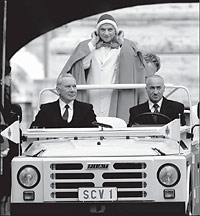Pope seeks to calm muslim anger... good luck

Pope Benedict XVI has weighed in on the sensitive issue of rapport between Islam and the West: He said that violence, embodied in the Muslim idea of jihad, or holy war, is contrary to reason and God's plan, while the West was so beholden to reason that Islam could not understand it.
Nonetheless, in a complex treatise delivered Tuesday at the university here where he once taught, he suggested reason as a common ground for a "genuine dialogue of cultures and religions so urgently needed today."
In all, the speech seemed to reflect the Vatican's struggle over how to confront Islam and terrorism, as the 79- year-old pope pursues what is often considered a more provocative, hard- nosed and skeptical approach to Islam than his predecessor, John Paul II.
As such, it distilled many of Benedict's longstanding concerns, about the crisis of faith among Christians and about Islam and its relationship to violence. And he used language open to interpretations that could inflame Muslims, at a time of high tension among religions and three months before he makes a trip to Turkey.
He began his speech by quoting a 14th-century Byzantine emperor, Manuel II Paleologus, in a conversation with a "learned Persian" on Christianity and Islam -"and the truth of both."
"Show me just what Muhammad brought that was new, and there you will find things only evil and inhuman, such as his command to spread by the sword the faith he preached," the pope quoted the emperor.
The pope went on to say that violent conversion to Islam was contrary to reason and thus "contrary to God's nature."
But the section on Islam made up just three paragraphs of the speech, and he devoted the rest to a long examination of how Western science and philosophy had divorced themselves from faith - leading to the secularization of European society that is at the heart of Benedict's worries.
This, he said, has closed off the West from a full understanding of reality, making it also impossible to talk with cultures for whom faith is fundamental.
"The world's profoundly religious cultures see this exclusion from the divine, from the universality of reason as an attack on their most profound convictions," he said. "A reason which is deaf to the divine and which relegates religion into the realm of subcultures is incapable of entering into the dialogue of cultures."
Several experts on the Catholic Church and Islam agreed that the speech - in which Benedict made clear he was quoting other sources on Islam - did not appear to be a major statement on, or condemnation of, Islam. The chief concern, they said, was the West's exclusion of religion from the realm of reason.
Still, they said that the strong words he used in describing Islam, even that of the 14th century, ran the risk of offense.
Renzo Guolo, a professor of the sociology of religion at the University of Padua, in Italy, who often writes about the church and Islam, said he was struck by the suggestion of Islam as distant from reason.
"This is maybe the strongest criticism because he doesn't speak of fundamentalist Islam, but of Islam generally," he said, "Not all Islam, thank God, is fundamentalist."
The Reverend Daniel Madigan, rector of the Institute for the Study of Religions and Cultures at the Pontifical Gregorian University, in Rome, said the central point was that "if we are really going into a serious dialogue with Muslims, we need to take faith seriously."
But, he said of the quote from the emperor, "You clearly take a risk using an example like that."
Marco Politi, a Vatican expert for the Italian newspaper La Repubblica, said that "the text reveals his deep mistrust regarding the aggressive side of Islam."
"Certainly he closes the door to an idea which was very dear to John Paul II - the idea that Christians, Jews and Muslims have the same God and have to pray together to the same God," he said.
The speech was a central moment in Benedict's six-day trip home to visit Bavaria, where he grew up, became a priest, a prominent theologian and, finally, a cardinal.
Earlier in the day, at an outdoor Mass here attended by some 250,000 people, he expressed similar concerns as in the speech, urging believers to stand up against the "hatred and fanaticism" that he said were tarnishing the image of God.



Comments